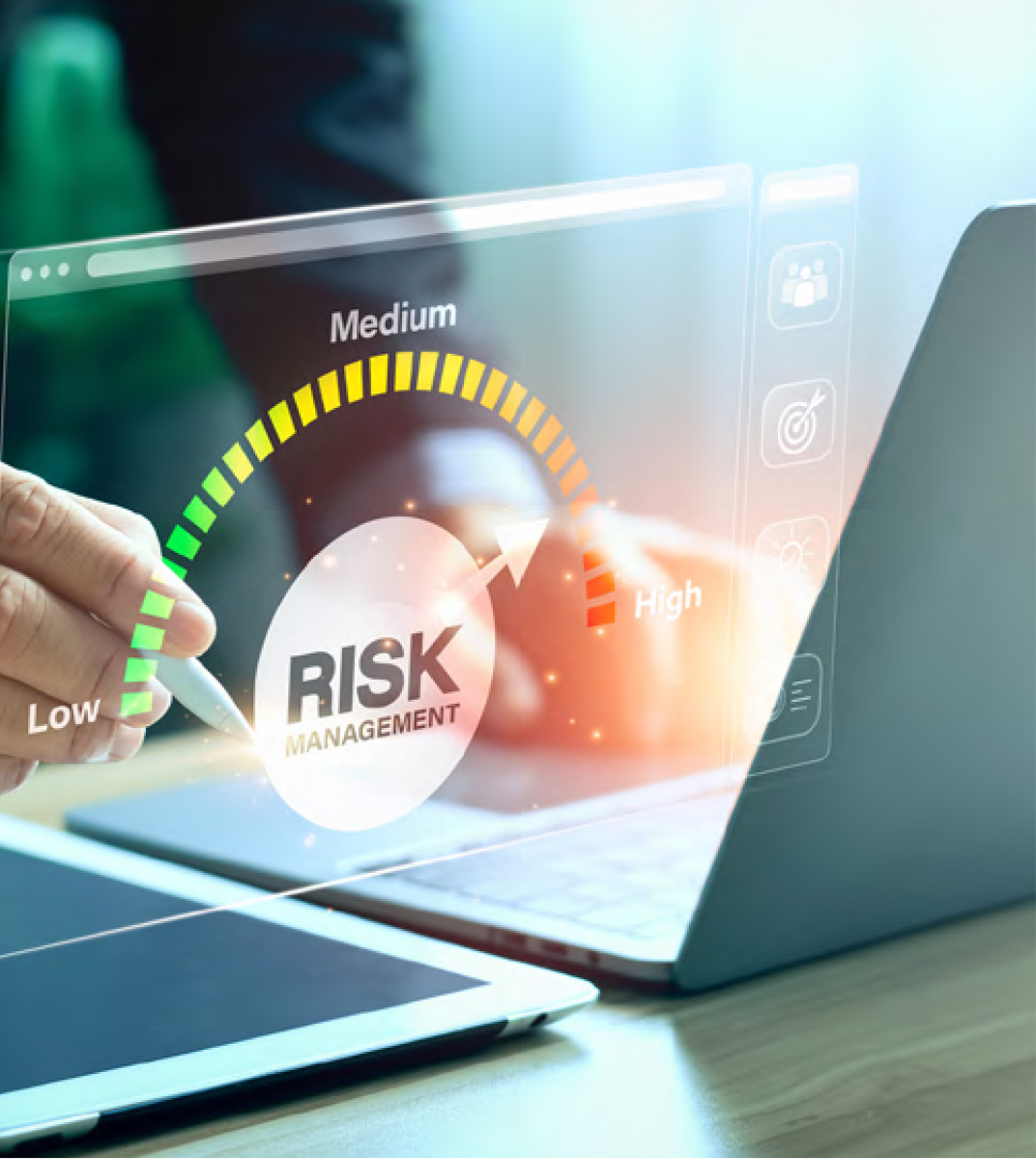Risk Management
Approach to Risk Management
We strive to cultivate a culture of risk awareness and responsibility to ensure long-term success by identifying, assessing, and treating risks that could impact objectives, efficiency, and stakeholder value. LTIMindtree incorporates risk management into decision-making through our ERM framework, aligned with ISO 31000 guidelines.
Enterprise Risk Management
Our ERM framework provides a comprehensive approach to assess and mitigate risks while identifying emerging opportunities. It helps improve accountability within the organization and supports our strategic goals. The framework defines processes to manage risks at different levels of the organization, including Projects, Accounts, Business Units and at Enterprise level. A digital platform offers a unified view of risks and opportunities, enabling informed decision-making.
(To read more about the ERM framework and
responsible board committees,
refer to
![]() Read more and Read more of the statutory reports)
Read more and Read more of the statutory reports)

Enterprise Risks and their Mitigation
ATTRITION
The attrition of high-potential employees or leadership can disrupt operations, elevate hiring costs, and adversely affect knowledge retention.
- Strengthening our engagement framework with an enhanced focus on rewards and recognition
- Implementing holistic career management through defined career paths for growth and upskilling
- Rolling out a customized leadership development program
- Promoting workplace flexibility to support employees’ diverse needs
ARTIFICIAL INTELLIGENCE
AI is considered more of an opportunity than a risk. The Company needs to ensure certain steps are taken so that it can best leverage the opportunity and mitigate the risk.
Multiple efforts are underway to prepare for AI opportunities. The following components are being leveraged:
- Customer engagement
- Service offerings
- Investment in AI platform and internal projects
- Skill development
- Compliances and regulatory framework
DATA PRIVACY AND COMPLIANCE
Breaches in data protection may lead to regulatory penalties, reputational damage or financial loss.
- Develop robust data retention policy for regulatory compliance
- Create comprehensive AI governance framework
- Integrate Privacy by Design principles for user data protection
- Provide mandatory training and awareness to all associates
INFORMATION SECURITY
Inadequate cybersecurity posture in terms of people, processes and technology may result in cyber threats compromising client confidence.
- Build and implement an effective cybersecurity assessment program to assess our environment against global cybersecurity best practices and frameworks
- Review the security posture to manage cyber risk both internally and externally
- Ensure that benchmark security scores are met
- Deploy mandatory training and awareness program for all employees
REVENUE HEADWINDS
Our revenue growth may see challenges due to:
- Decrease in IT spending impacting potential market
- Clients prioritize projects with quicker ROI, leading to smaller deal sizes
- Focused programs designed to navigate the complexities of the uncertain market and drive sustainable growth
- Increase revenue from top 100 accounts
- Deploy upselling and cross-selling strategies for accounts exceeding USD 1 Million
- Pursue proactive approaches for securing large deals
- Concentrate efforts on acquiring new clients and engaging with emerging technology players
MARGIN PRESSURE
Margin implications are compounded by factors such as revenue headwinds, low-margin new contracts, greater operating costs from employees returning to office, and increased costs from new recruits.
Margin improvement program has been initiated and includes:
- Collaborative ownership of margin targets by Sales and Delivery
- Use of an integrated forecasting tool for accurate revenue predictions
- Rate realization
- Resource optimization
- Reduction of low-margin projects
MACROECONOMIC AND GEOPOLITICAL ENVIRONMENT
Economic uncertainty, geopolitical instability and any political dispute may affect the business operations and revenue growth.
- Diversify geographic presence to reduce geographic dependencies
- Focused programs to reduce business concentration
- Crisis Management and Business Continuity Plans to ensure safety of employees and continuity of operations
- Conduct country risk assessments across multiple parameters periodically, to ensure emerging risks are tracked
- Deploy appropriate hedging strategies
- Collaborate with government agencies for relevant advisories
ESG
Environment
The inability to reduce emissions, water scarcity, and non-compliant waste management can significantly impact sustainability.
Social
Community Development (CSR) and Diversity, Equity & Inclusion (DE&I) are crucial for organizational success. A lack of inclusion affects teams’ potential to respect differences and collaborate meaningfully. This may, in turn, impact the productivity of the team.
Governance
Governance and the associated risks of data integrity and transparency are increasingly relevant.
Failure in transparent and timely reporting may lead to non-compliance and reputational loss with stakeholders.
Environment
- Reduce Scope 1 and Scope 2 emissions through focused programs and set targets
- Efforts to increase renewable energy
- Initiatives to reduce water consumption and increase waste recycling
Social
- Enhance community development through various CSR initiatives focusing on women and youth empowerment, including employment, skilling and education, providing market linkages, and supporting micro-entrepreneurship
- Establish effective KPIs for measuring the outcomes through robust review and governance mechanism for critical or flagship projects
- Increase diversity (Gender, PwD, LGBTQ+, veterans, ethnicity/nationality) through focused hiring, inclusive policies, and career development programs
Governance
- Ensure transparent and accountable disclosures via non-financial sustainability and ESG reports
- Maintain or further improve various ESG ratings
- Adhere to various regulatory requirements
FRAUD GOVERNANCE
Fraudulent operations have the potential to erode confidence among clients, shareholders, and investors, leading to operational, financial, and reputational loss.
- Strengthen the implementation of Fraud Prevention policy
- Enhance whistleblower processes to encourage fraud reporting for all associates, vendors and clients
- Strengthen governance procedures to ensure timely resolution of fraud cases
- Conduct critical business and financial process audits for assurance
- Deploy training and awareness programs
- Explore the utilization of technology and data patterns to prevent potential fraud